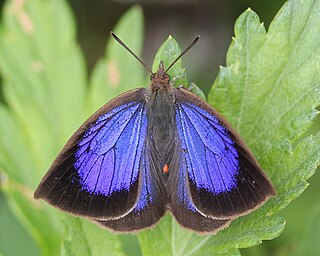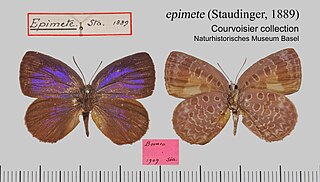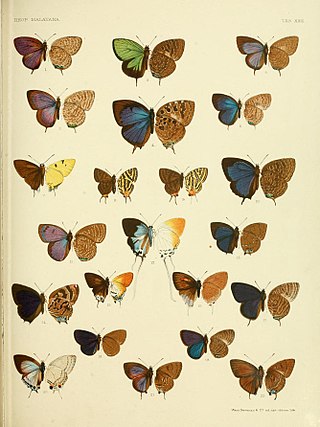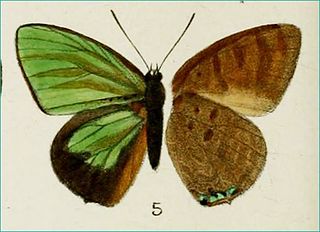
Arhopala eumolphus, the green oakblue, is a lycaenid butterfly found in the Indomalayan realm. The species was first described by Pieter Cramer in 1780.

Arhopala is a very large genus of gossamer-winged butterflies (Lycaenidae). They are the type genus of the tribe Arhopalini. In the relatively wide circumscription used here, it contains over 200 species collectively known as oakblues. They occur from Japan throughout temperate to tropical Asia south and east of the Himalayas to Australia and the Solomon Islands of Melanesia. Like many of their relatives, their caterpillars are attended and protected by ants (myrmecophily). Sexual dichromatism is often prominent in adult oakblues.

Arhopala opalina, the opal oakblue, is a species of lycaenid or blue butterfly found in Assam, Burma, Thailand, the Malay Peninsula and Java.

Arhopala madytus, the bright oakblue, is a butterfly of the family Lycaenidae. The species was first described by Hans Fruhstorfer in 1914. It is found on New Guinea and adjacent islands and the north-east coast of Queensland, Australia.

Arhopala paramuta, the hooked oakblue, is a butterfly of the family Lycaenidae. It is found in South-East Asia.

Arhopala agesilaus is a species of butterfly belonging to the lycaenid family described by Otto Staudinger in 1889. It is found in Southeast Asia.

Arhopala amphimuta is a species of butterfly belonging to the lycaenid family described by Cajetan Felder and Rudolf Felder in 1860. It is found in Southeast Asia - Peninsular Malaya, Sumatra, Borneo, Bangka, the Philippines, Thailand, Mergui, Burma, Langkawi, Penang and Java.

Arhopala epimete, the violetdisc oakblue, is a species of butterfly belonging to the lycaenid family described by Otto Staudinger in 1889. It is found in Southeast Asia.

Arhopala fulla , the spotless oakblue, is a species of butterfly belonging to the lycaenid family described by William Chapman Hewitson in 1862. It is found in Southeast Asia

Arhopala hypomuta is a species of butterfly belonging to the lycaenid family described by William Chapman Hewitson in 1862. It is found in Southeast Asia

Arhopala major is a species of butterfly belonging to the lycaenid family described by Otto Staudinger in 1889. It is found in Southeast Asia.

Arhopala similis is a species of butterfly belonging to the lycaenid family described by Hamilton Herbert Druce in 1895. It is found in Southeast Asia . In this species, contrary to Arhopala catori, all the 4 spots in the costal area of the hindwing beneath are distinctly developed and in distinct light rings. In the forewing the postmedian transverse band is entirely absent, whilst in the hindwing it is broken up into hardly contiguous rings. Above the male is still more broadly margined with black than A. catori, particularly in the apex; the female is very similar to it, lighter blue.

Arhopala zambra, the Zambra oakblue, is a species of butterfly belonging to the lycaenid family described by Charles Swinhoe in 1911. It is found in Southeast Asia.

Arhopala adherbal is a butterfly in the family Lycaenidae. It was described by Henley Grose-Smith in 1902. It is found in the Australasian realm, where it has been recorded from Aru, Halmahera, Waigeu, and from western Irian to Papua New Guinea.

Arhopala antimuta or small tailess oakblue is a butterfly in the family Lycaenidae. It was described by Cajetan Felder and Rudolf Felder in 1865. It is found in the Indomalayan realm.

Arhopala anamuta is a butterfly in the family Lycaenidae. It was described by Georg Semper in 1890. It is found in the Indomalayan realm where it is endemic to the Philippines.

Arhopala borneensis, is a butterfly in the family Lycaenidae. It was described by George Thomas Bethune-Baker in 1896. It is found in the Indomalayan realm where it is endemic to Borneo.


















